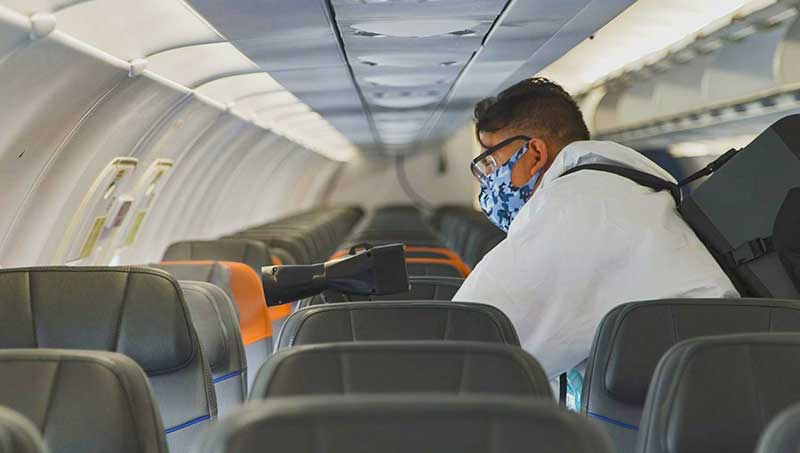
spraying 6
Watching session after session at Thursday’s digital World Aviation Festival, you couldn’t help but think that one airline executive after another top manager was reading from the same piece of paper. Their message: governments must work together on common Covid-measures so that international air travel can quickly move forward again.
And you heard this very often too: people are very eager to fly again. That they are reluctant to travel, has all to do with predictability, says KLM-CEO Pieter Elbers: “Customers want predictability as far as travel restrictions are concerned, but right now there is a lot of hesitation because of regulation changes and restrictions that can change by the last minute.” Like many airlines, KLM saw this reflected in its bookings from mid-August as passengers canceled or rescheduled booked flights, requested refunds, or didn’t book at all.
The lack of unity among countries will have a detrimental effect on the airline industry, warned IATA Director General Alexandre de Juniac. “In our earlier forecast we have said we expect air travel to recover by late 2023 or early 2024, but this won’t happen is governments don’t lift travel restrictions. And without a strong aviation sector, recovery of the world economy will be slower.” As far as government support to airlines, De Juniac added, “the longer this crisis lasts, the more government support we will need. Look at what our US-members have done by asking an extension of their support scheme.”
“What we need is multi-level coordination by governments to get borders lifted”, said Air Asia Chief Commercial Officer, Karen Chan. She gave an example of how the Malaysian and Singapore governments have been working together on this, which has allowed cross-border tourism to restart again.
Jane Jie Sun, CEO of China’s biggest online air travel company Trip.com, said: “I hope governments will take concerted efforts to work together and create safe bubbles, between which people can travel safely. Requiring to go into quarantine for two weeks and take 28 days off for a holiday is impossible for a traveler.”
IATA wants systematic pre-flight testing
IATA has called on governments to introduce systematic pre-flight Covid-testing worldwide as an alternative to quarantine. “We will work on this via the International Civil Aviation Organization (ICAO) and the World Health Organization (WHO) to get a common set of recommendations. It won’t be easy, but we will succeed”, De Juniac said optimistically.
He has the full support of Mehmet Nane, CEO of Turkish leisure airline Pegasus: “We need this ICAO and global procedures, otherwise we will get unfair competition between regions over health issues. There needs to be a basic standard of health checks that is similar for everyone.”
KLM’s Pieter Elbers agreed: “Aviation is a global industry. We need global solutions, but the political reality is that there will be local rules. At least in Europe, we need harmonization and a solution for the current patchwork of measures.”
Lufthansa CEO Carsten Spohr said in the closing WAF-interview on September 25 that he expects to offer a pre-flight Covid-test on selected routes for some EUR 7. His airline has been in direct discussions with the US and Canadian governments about organizing these tests so that the hugely important North-American route can be opened up again. He also is lobbying through IATA, ICAO, and Airlines 4 Europe to get movement on this issue.
What if there is a vaccine for Covid-19: will testing be gone? Jie Sun hopes so: “It could be that there will be permanent checks for flue and temperature takings as well, but Covid-testing or quarantine won’t be necessary if there is a vaccine.”
Karen Chan is not so sure: “This will be the new normal. In China and Asia, there is more readiness to accept measures than in Europe because we have been confronted with a virus similar to this before with SARS. Even with a vaccine, some players will be asking for tests.”
This could have a huge impact on travel too, Chan said. “We fly many workers who have small salaries probably can’t afford to pay for a vaccine or test.” Easyjet’s Johan Lundgren said during a separate interview on this: “It can’t be right if people can’t fly anymore because they have to pay for expensive tests that could cost a family hundreds of pounds.”
IATA’s De Juniac says that costs for testing have come down drastically to six to eight dollars, but still thinks they should be paid for by governments. The testing industry should be ready in October for taking one million Covid-tests per day, he said. “Testing all passengers will give people back their freedom to travel with confidence. And that will put millions of people back to work.”
Something that’s likely to stay in the post-Covid era is intense cleaning of aircraft, expects JetBlue COO Joanna Geraghty. Her airline was at the forefront of rigorously cleaning aircraft cabins, including individual table trays. JetBlue has no intention is stopping that, although it is looking at which technology and process works best and as long as it doesn’t lead to increased damage of seats.
Views: 1



